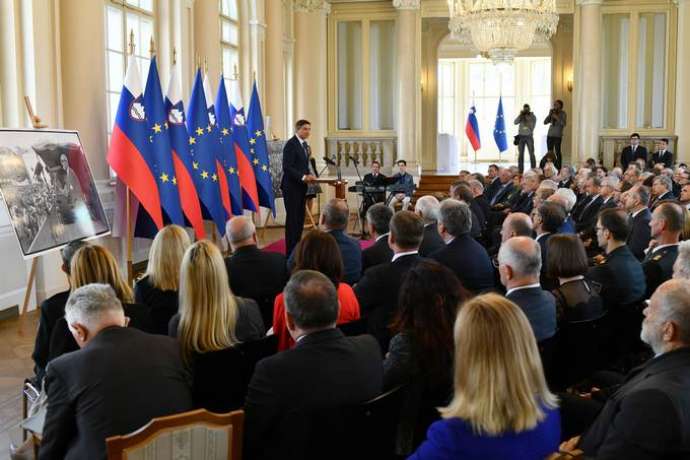STA, 7 May 2019 - President Borut Pahor highlighted the "unforgettable symbolic and actual role" the May Declaration played for Slovenia's independence, as he hosted a reception to mark 30 years since the document calling for the country's sovereignty was read out at a mass rally in Ljubljana's Congress Square.
Since the declaration paved the way to Slovenia's independence, it deserves to have a permanent place in our collective memory, he said at the Presidential Palace on Tuesday.
"Its greatest value is linking democracy, sovereignty and Slovenia's place in an overhauled Europe, which also makes it important for the future."
Admitting that Slovenia would need to keep working on the three goals, he said "all three elements need our encouragement, criticism and debates, but also due cooperation and consensus".
V Predsedniški palači prva državna obeležitev 30. obletnice Majniške deklaracije 1989 za suvereno državo slovenskega naroda https://t.co/RJcLamqTsA pic.twitter.com/21KwDhqU6S
— Borut Pahor (@BorutPahor) May 7, 2019
"We decide on our own state and its democracy on our own, and on European future together with other nations," he said at the first-ever state-level event marking an anniversary of the reading of the 1989 declaration.
"Also today, 30 years on, it is clear that the sovereign Slovenian state, democratic and integrated into Europe, is the basic tool of our existence and development."
He recalled that the public legitimation of the idea about the sovereignty of the Slovenian nation had only been possible during the political spring in the late 1980s. "Before that, it was considered illegitimate."
Just like Dimitrij Rupel, a co-author of the declaration, Pahor stressed the 1989 events had led to the first democratic elections, a referendum on independence, decisions on Slovenia's independence and to the country's international recognition.
Outlining the conditions under which it was written, Rupel said the declaration came into being in his office at the Faculty of Sociology, Political Sciences and Journalism in April 1989.
Writer Tone Pavček was asked to read it "because the Slovenian Writers' Association was the first organisation signed under the declaration and because we did not want it to be interpreted as a manifesto belonging to any of the four [political] parties," said Rupel.
The declaration was also signed by the Slovenian Democratic Union (SDZ), the Slovenian Farmer's Union (SKZ), the Slovenian Christian and Social Movement (SKSG), the Socialdemocratic Union (SDZS), the university conference of the Socialist Youth League of Slovenia (ZSMS) and the Slovenian Composers' Association.
Its name was taken from the 1917 declaration in which Slovenian, Croatian and Serbian deputies demanded living in an autonomous unit within the Austro-Hungarian Empire. The document was read in the Vienna parliament on 30 May 1917 by Slovenian deputy Anton Korošec.
The declaration reading led to independence, but the document would have been overlooked had it not become part of the Committee for the Protection of Human Rights' campaign for the release of all four dissidents from the JBTZ military trial, said Jožef Školč, the then president of the ZSMS.
Since neither the committee nor the ZSMS had a permit for the rally, the declaration was read at what was formally termed an open session of the ZSMS in Congress Square, Školč, who hosted an event on the occasion at the Museum of Contemporary History, told the STA.
"We simply took the risk of holding a session of the sociopolitical organisation and waited if anyone would dare ban it," said Školč, noting they had tried to express their frustration at the second arrest of Janez Janša, now the leader of the opposition Democrats (SDS).
Igor Bavčar, who led the committee, said, as he addressed the event at the museum, the events from 30 years ago were a reminder of what could be achieved with perseverance.
"That was a time full of emotions and unpredictability, of some realistic but often also imaginary dangers and disinformation.
"It became clear what we had avoided only after certain documents were discovered later on," he said, adding a new wave of arrests had been planned but had probably not taken place because of their activity.
Bavčar said the late 1980s and early 1990s had been a time of incredible enthusiasm which brought together people of different ideologies, which he sees as a special value.
Bavčar, who soon became interior minister and later led the Istrabenz conglomerate, is happy with the legacy of the May Declaration.
He is however less happy "with everything that has befallen me, and I'm still fighting against it," he said in reference to his serving a prison sentence for money laundering.






